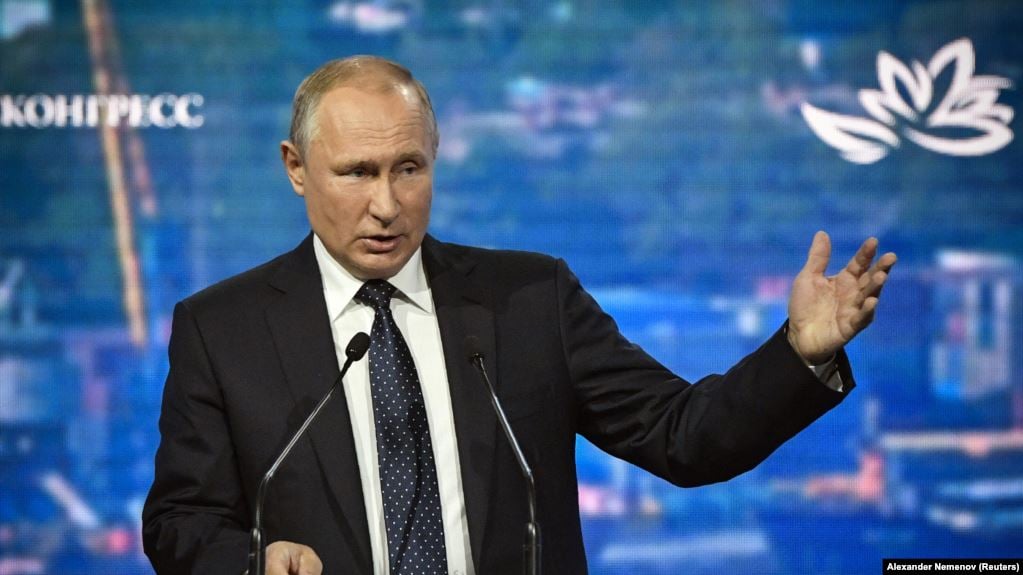
By Polygraph
“We are not responsible for the Ukraine’s crisis. We did not support the unconstitutional coup in Ukraine, and we did not provoke the reaction of part of the country’s population to these actions… …as for Crimea, the Crimean people made a decision, voted. The question is closed as a matter of history, there is no going back to the previous system, absolutely not.”
False
Putin’s claims have been debunked many times.
During the Eastern Economic Forum in Vladivostok on September 3, the moderator, Australian ex-Prime Minister Kevin Rudd, asked Russian President Vladimir Putin about Western sanctions imposed on Russia in 2014 in response to Russia’s actions in Ukraine.
Putin responded: “We are not responsible for the Ukraine’s crisis. We did not support the unconstitutional coup in Ukraine, and we did not provoke the reaction of part of the country’s population to these actions. And this is what led to Crimea’s desire to be part of the Russian Federation, and Donbas – that is, Donetsk and Luhansk – started resisting the regime, which, right after the coup, wanted to establish its authority in these areas. The situation gradually deteriorated. I can tell you only one thing: as for Crimea, the Crimean people made a decision, voted. The question is closed as a matter of history, there is no going back to the previous system, absolutely not.”
Putin’s claims about Ukraine are false and have been debunked many times by Polygraph.info and others.
Putin’s claim that Russia did not support an “unconstitutional coup in Ukraine” is correct, if only because there was no coup in Ukraine. Putin is referring to the oft-repeated claim that Ukraine’s 2014 Maidan Revolution was a coup d’etat. Polygraph.info has dealt with that issue more than once.
READ: Ukraine’s Maidan Revolution Was Not a ‘Coup’
READ: RT Distorts History of Maidan Revolution in Ukraine
Putin claimed the people of Crimea — i.e. Ukrainian citizens – wanted to join Russia. Yet that ‘desire’ coincided with the deployment of Russian troops, in uniforms without insignia, who seized Crimea’s parliament and took control of airports and military installations across the peninsula. In reality, the “referendum” was hastily arranged with the help of the Russian military and compliant Crimean authorities, and the Kremlin’s desired result was achieved in roughly two weeks. However, the evidence suggests that as little as a third of the Crimean population voted in the referendum.
READ: The Crimean Annexation Five Years On
As to the fighting in the Donbas — that, too, only broke out when Russian mercenaries showed up. In fact, Igor Girkin (AKA Strelkov), the then military leader of the “separatist” forces who claimed responsibility for starting the war in the spring of 2014, is a Russian citizen.
READ: Does Russia Bear Responsibility for War in Ukraine?
READ: Russia Rehashes the Claim: Not Party to Donbass Conflict
READ: Russian Media Repeats False Claim on Use of Force in Eastern Ukraine
Speaking about the Minsk II agreements, Putin claimed that the Ukrainian side is at fault for the failure of those peace accords.
“Everything is written in black and white,” Putin said. “By late 2015 amendments were to be made to the Ukrainian constitution. They were not. A law on the special administrative status of these areas was to be enacted. It has not been. A law on amnesty was to be passed and signed by the president. It has been passed by the Rada, but not signed by the president. A law on municipal elections has to be passed. It has not been.”
Yet while Putin said the Minsk II provisions were written in black and white, he distorted some of those provisions while ignoring the Russian side’s flagrant violations of the ceasefire required by the agreement. These ceasefire violations began in 2015, when Russian forces continued fighting in and around the town of Debaltseve. Since then, numerous ceasefire violations by Russian-led forces have been documented. Also, Minsk II calls for municipal elections to be implemented according to Ukrainian law –something that local pro-Russian authorities have refused to do.
While both sides wrangle over the order of implementation of certain points in the Minsk II agreements, it is important not to lose sight of the fact that Russia’s invasion is the reason for the Minsk talks in the first place, and it repeatedly violated that agreement, even at the very moment it was set to go into effect in 2015.
READ: Putin Claims Kyiv Must Act First Before Border With Russia Closed
By Polygraph







